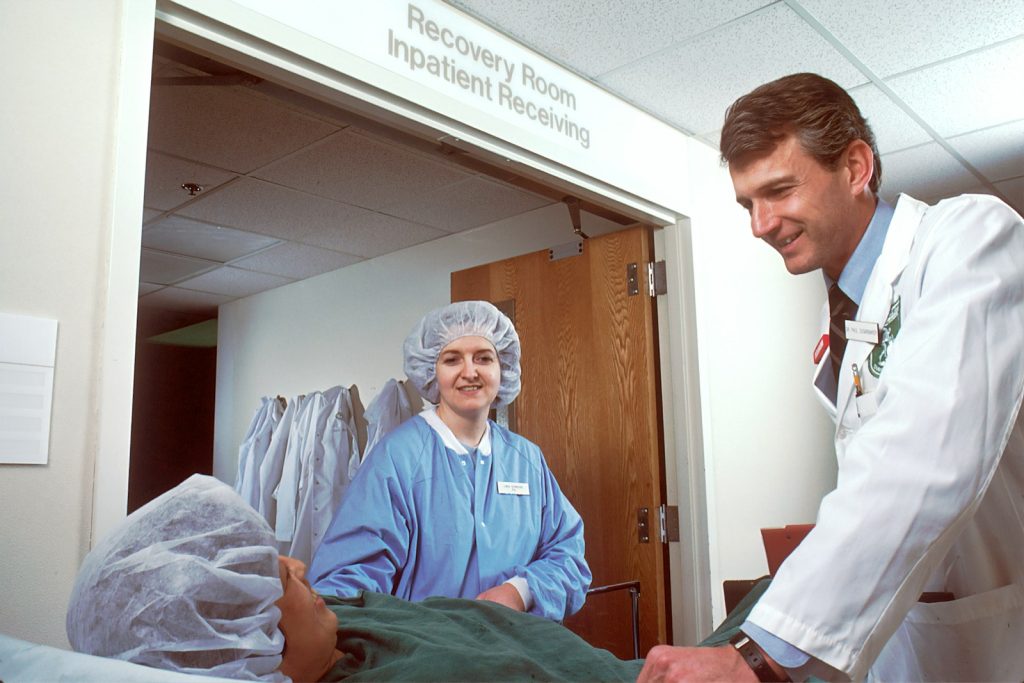In the healthcare sector, the capability of professionals directly impacts patient safety and care quality.
Doctors, nurses, and other healthcare staff are entrusted with lives daily. Their competence and knowledge are critical, making the verification of their educational credentials a key step in the hiring process.
Education verification is essential to confirm that healthcare professionals possess the requisite qualifications.
It ensures that the individuals responsible for patient care are appropriately trained and knowledgeable.
The Critical Role of Education in Healthcare
Impact on Patient Safety and Care Quality
Proper education equips healthcare professionals with the skills and knowledge needed to provide high-quality care.
Verified educational credentials assure you as the employer that your staff can perform complex medical procedures, make informed decisions, and handle emergencies effectively.
This directly translates to better patient outcomes, fewer medical errors, and overall improved care quality.
Legal and Ethical Considerations
As a healthcare employer, you are legally and ethically obligated to ensure that your staff has the required qualifications.
Hiring unqualified personnel can lead to severe legal consequences, including malpractice lawsuits and hefty fines.
Ethically also, your healthcare facility must ensure that the patients receive care from competent professionals, upholding the trust placed in you by the community.
Risks of Hiring Without Education Verification
Medical Errors and Malpractice
Unqualified staff can lead to an increase in medical errors and malpractice cases.
For instance, a 2019 study found that misdiagnoses accounted for 34% of all medical malpractice claims, often due to inadequate training or insufficient knowledge.
Financial and Reputational Damage
Medical errors not only harm patients but also result in substantial financial losses for healthcare facilities.
Lawsuits, settlements, and the loss of business due to damaged reputations can be financially crippling.
Your hospital or clinic may also face increased insurance premiums and decreased patient trust.
Regulatory Penalties
Healthcare institutions are subject to strict regulatory standards. Non-compliance, including failure to verify education, can lead to severe penalties.
These can range from fines to the revocation of operating licenses, severely impacting the facility’s ability to function.
Compromised Patient Care
When unqualified individuals provide care, patient safety is compromised.
Misdiagnoses, incorrect treatments, and poor patient management are just a few examples of the risks posed by unverified staff. These incidents can lead to long-term health issues or even fatalities.
Increased Staff Turnover
Hiring unqualified staff at your medical facility can result in higher turnover rates.
As unfit employees are identified, they must be replaced, leading to increased recruitment and training costs. This constant churn can destabilize the work environment and reduce overall team morale.
Loss of Accreditation
Your healthcare facility must meet specific standards to maintain accreditation.
Hiring unverified staff can jeopardize this status, leading to the loss of accreditation and associated privileges, such as participation in insurance programs and receiving certain types of funding.
Legal Liabilities
As an employer, you can face direct legal liabilities if they fail to verify the educational credentials of their staff.
This can include negligence claims and breaches of employment laws, leading to costly legal battles and settlements.
Public Trust Erosion
Public trust is foundational to healthcare operations. Scandals or incidents involving unqualified healthcare providers can severely erode public confidence, leading to a decline in patient numbers and overall community support.
Steps in the Education Verification Process
Initial Screening
The initial screening involves reviewing resumes and applications to ensure that candidates meet the basic educational requirements. This step helps to filter out clearly unqualified applicants early in the process.
Document Verification
In this step, you must authenticate educational documents such as diplomas, transcripts, and certificates. This often involves checking for the issuing institution’s legitimacy and ensuring that the documents are not forged.
Verification with Educational Institutions
Contacting educational institutions directly is a crucial step. This verification confirms that the candidate attended the institution and completed the stated program.
Some institutions have dedicated offices to handle such requests, providing timely and accurate responses.
Continuous Monitoring
Education verification should not be a one-time event. Continuous monitoring involves periodic checks and updates to ensure that credentials remain valid and that any further education or training claimed by the staff is legitimate.
Benefits of Comprehensive Education Verification
Enhanced Patient Safety
Verified educational credentials ensure that the healthcare professionals who you have employed possess the necessary knowledge and skills.
This directly contributes to safer patient outcomes, as qualified staff are better equipped to handle complex medical situations.
Improved Hiring Accuracy
Thorough verification processes lead to better hiring decisions. You can be confident that you are selecting the most qualified candidates, reducing the risk of future issues related to competency and performance.
Strengthened Trust and Reputation
Maintaining high standards through rigorous education verification boosts your institution’s credibility. Patients are more likely to trust and choose your healthcare facility if they know that you employ well-qualified professionals.
Reduced Legal and Financial Risks
Education verification minimizes the risk of hiring unqualified staff, thus reducing potential legal liabilities and financial losses from malpractice claims and regulatory fines.
Higher Employee Retention
Hiring qualified professionals leads to a more stable and satisfied workforce. Qualified employees are likely to perform better and stay longer, reducing turnover rates and associated costs.
Compliance with Regulations
Education verification ensures compliance with regulatory standards, avoiding penalties and maintaining accreditation. This compliance is essential for the continued operation and credibility of your healthcare institutions.
Better Organizational Performance
Qualified staff contribute to overall organizational performance. With the right knowledge and skills, healthcare professionals can work more efficiently and effectively, improving patient outcomes and operational success.
Increased Patient Satisfaction
Patients have higher satisfaction levels when treated by competent healthcare professionals. Verified credentials ensure that staff can provide the best care, leading to positive patient experiences and reviews of your healthcare facility.
Challenges in Education Verification
Forged Documents and Misrepresentation
One of the primary challenges is the prevalence of forged documents and misrepresentation.
Sophisticated fake degrees and certificates can be difficult to detect without thorough verification processes.
International Education Verification
Verifying international educational credentials adds complexity. Different countries have varying standards and verification processes, making it challenging to ensure the authenticity of foreign qualifications.
Time and Resource Constraints
Thorough education verification is time-consuming and resource-intensive. As an employer, you need to allocate sufficient time and resources to conduct comprehensive checks, which can be challenging in a fast-paced environment.
Solutions and Best Practices
Partnering with Background Verification Companies
Consider consulting with a professional background verification company. It has the expertise and resources to conduct thorough and reliable verifications, ensuring that all credentials are authentic.
Implementing Automated Verification Systems
Automated systems can streamline the verification process, reducing time and resource burdens.
These systems can quickly verify credentials against databases, flagging any discrepancies for further investigation.
Train HR Teams
Investing in the training of HR teams is crucial. Properly trained HR personnel can effectively manage the verification process, recognizing red flags and ensuring that all steps are thoroughly completed.
Develop a Comprehensive Verification Policy
Creating a detailed verification policy ensures consistency and thoroughness in the hiring process.
This policy should outline the steps for verifying educational credentials, specify which documents are required, and detail the process for addressing any discrepancies or red flags that arise.
Utilizing Blockchain Technology for Verification
Adopting blockchain technology can enhance the security and accuracy of education verification.
Blockchain can provide an immutable record of educational credentials, making it easier to verify their authenticity and reducing the risk of forgery or tampering.
Collaborating with Educational Institutions
Establishing direct relationships with educational institutions can streamline the verification process. By working closely with universities and training programs, you can quickly and accurately verify the credentials of prospective hires.
Conducting Regular Audits
Regular audits of the verification process can help identify and rectify any weaknesses or gaps. Audits ensure that the verification procedures are being followed correctly and that any issues are promptly addressed, maintaining the integrity of the hiring process.
Conclusion
Education verification is critical for ensuring that the healthcare professionals that you employ are qualified and capable of providing high-quality patient care.
It helps prevent medical errors, protects against legal and financial risks, and enhances the overall reputation of your healthcare institution.
This helps to ensure that you hire the best professionals to deliver exceptional patient care.
Collaborating with AMS Inform
Navigating the complexities and ensuring thorough education verification often leads organizations to partner with AMS Inform. Since its inception in 1986, AMS Inform has garnered over 38 years of experience in the background verification sector.
Our team excels in education verification and also offers services such as Digital ID Verification, identity verification, and pre/post-employment checks. Additionally, we provide credit checks, health and drug screenings, insurance claim investigations, and language translation services.
With a footprint in over 160 countries and local teams in 16 of them, we are well-equipped to support your global operations.
Reach out to our team today for customized solutions tailored to your education verification needs.
















